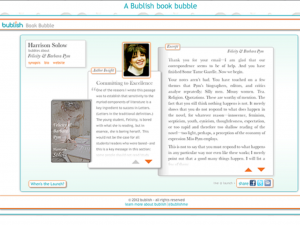Publishing Talks: Interview with Josh Schwartz of Pubvendo
May 9, 2023 by David
Filed under PublishingTalks, Technology
 Publishing Talks began as a series of conversations with book industry professionals and others involved in media and technology, mostly talking about the future of publishing, books, and culture. I’ve spent time talking with people in the book industry about how publishing is evolving in the context of technology, culture, and economics.
Publishing Talks began as a series of conversations with book industry professionals and others involved in media and technology, mostly talking about the future of publishing, books, and culture. I’ve spent time talking with people in the book industry about how publishing is evolving in the context of technology, culture, and economics.
Later this series broadened to include conversations that go beyond the future of publishing. In an effort to document the literary world, I’ve talked with a variety of editors, publishers and others who have been innovators and leaders in independent publishing in the past and into the present.
These conversations have been inspirational to me on many levels. I have gotten to speak with visionaries and entrepreneurs, as well as editors and publishers who have influenced and changed contemporary literature and culture. I’ve also had the opportunity to speak with a number of friends and colleagues I have met over the many years I have been in the book business.
Josh Schwartz is someone I met at a Book Expo several years ago (remember trade shows? Book Expo, previously known as the American Booksellers Association was an important social gathering for the book industry for more than 50 years, fostering a sense of community that is now lost). As often was the case at old-fashioned industry gatherings, it was purely a chance connection, as we sat together to eat lunch at the Javits Center one busy afternoon. That meeting is emblematic of how a good trade show can work – a chance meeting with someone that turns into a long term business connection and friendship.
Josh was then just launching his company, Pubvendo to specialize in digital marketing for books, working with authors and publishers of every size and kind. Now that it’s been some years he and his team have been at it, the work puts him in the middle of a very interesting part of the book business. Most of us agree that while publishing is not without challenges, marketing is the hardest thing we do. Every new book that is published is an entirely new product (unless it is part of a series or written by an author with an established brand). Every new book must be thought about and in some way “represented” or “presented” to potential readers, booksellers, librarians, media outlets, all of whom are busy, often overwhelmed with information, and hard pressed to notice any one book over any other. How do we find readers and help them discover our books when they have so many other books and media forms to choose from? That is the challenge of book publishing in the digital era. Data driven online marketing as practiced by Pubvendo and only a few other businesses is one way for publishers and authors to make those crucial connections. And while it might be “inside baseball” for some, this is a subject that most of us in the book business have to think about all the time.
Josh is both the Founder and Chief Executive Officer of Pubvendo, which makes him responsible for digital campaign methodology, strategy, and execution. He started in the book business in 2010, working for digital production companies, Aptara and Jouve. He holds a bachelor’s degree in American Literature from George Mason University and a master’s degree from Georgetown University.
Aside from his literary interests, which inform his day-to-day work with publishers and authors, he’s willing and able to engage with a variety of subjects and try to find ways to connect books of all kinds with the right readers – especially the ones who want to buy those books. It is no easy thing to navigate the continuously changeable online universe, but Josh seems better equipped than most to figure it out and at the same time, have some fun and enjoy the ride.
In this conversation, we covered a wide range of topics relating to marketing and publishing – primarily focusing on digital matters but really this is about marketing books in an extremely complex and constantly changing environment. We even talked about AI, the latest and greatest in a series of “new developments” that have faced book publishing over the last twenty years or more.
One thing is certain – there are no final answers, but there are always alot of really important questions.
Podcast: Play in new window | Download
Publishing Talks: David Wilk Interviews Kathy Meis of Bublish
July 15, 2012 by David
Filed under Ebooks and Digital Publishing, PublishingTalks, Technology, The Future
 In this series of interviews, called Publishing Talks, I talk to book industry professionals and other smart people about the future of publishing, books, and culture. This is a period of disruption and change for all media businesses. How will publishing evolve as our culture is affected by technology, climate change, population density, and the ebb and flow of civilization and economics?
In this series of interviews, called Publishing Talks, I talk to book industry professionals and other smart people about the future of publishing, books, and culture. This is a period of disruption and change for all media businesses. How will publishing evolve as our culture is affected by technology, climate change, population density, and the ebb and flow of civilization and economics?
I hope these Publishing Talks conversations will help us better understand the outlines of what is happening in publishing, books and reading culture, and how we can ourselves both understand and influence the future of books and reading.
There has been alot of talk around the publishing business this year about “book discovery” as it is clear that the decline of bricks and mortar bookstores has lessened the opportunity for readers to discover books they want to read through the kinds of browsing and personal recommending that have been the hallmarks of physical bookselling up to now. Online bookselling and even social media have thus far been less than perfect mechanisms for either writers or readers, with lots of frustration expressed especially by publishers and writers about the whole process. We’re not sure we know what readers think about all this, but there is doubtless much to be inferred.
The relatively steep decline in overall sales of print books, and the increase in the concentration of sales to best sellers (witness 50 Shades of Gray, among others) suggest that readers are not finding it easy or practical to take advantage of the online availability of just about every book in print. There are too many books and not enough connection tools for most of them.
Meanwhile, there are intelligent people out there seeking to solve these twin “problems” of too many choices for readers, and ineffective online marketing tools for authors and publishers. One new project that is the result of some deep thinking about both issues is Bublish, which seeks to create opportunities for social discovery of books by readers. One of the founders is Kathy Meis, whom I met briefly at this year’s IDPF summit at Book Expo in New York City.
Here is what Kathy said about Bublish in an online interview she did recently with Madison Woods:
With Bublish, authors share book bubbles, and readers get to browse through them. A book bubble consists of an excerpt and an author’s insight about that excerpt. We call this the story behind the story. Both of these elements are presented in a beautifully designed book bubble that also includes the author’s photo and bio, the book’s cover and synopsis as well as links to the author’s website. It’s about as close to the bookstore discovery experience as you can get online. And because we match writers and readers by genre and keywords, we can connect the right authors and books with the right readers without ruining the serendipity of browsing. In an age of immense content abundance, you need a few filters when you’re looking for good books.
Bublish is designed to solve a number of problems for writers and readers. For authors, Bublish will let them repurpose their best writing, the content of their books, and enrich it with the story behind the story. This creates an entirely fresh piece of content for authors to share across multiple social networks. Authors have a lot of demands on their time. We think it’s important to make it as easy and effective as possible for them to facilitate discovery of their work without feeling like salespeople. With Bublish, the social conversation starts with the voice of the author, just like it does in the bookstore. And since authors can create and share book bubbles in seconds, Bublish significantly lightens the author’s promotional content load.
For readers, Bublish recreates online all the pleasure of the bookstore discovery experience. No ads, no algorithms, no distractions…just browsing. Of course, once a reader finds a book or author they love, they’ll want to share it. Word-of-mouth continues to be the most popular way for readers to find new books. That’s why book bubbles are highly shareable across multiple social networks. Finally, Bublish will create a wonderful community for writers and readers to engage around stories. Imagine getting an invitation to chat with one of your favorite authors or being able to follow the book bubbles of an author you’ve never even heard of before.
In my interview with Kathy we talked about Bublish and also about many of the perplexing issues surrounding writing and reading, as we enter a new stage in the ways that writers, publishers and readers will relate to each other, indeed a very exciting and challenging time for us all.
 Kathy Meis has been a professional writer for more than twenty years. She founded Serendipite Studios to empower those who create and enhance quality content. You can follow her on Twitter @katmeis or @BublishMe.
Kathy Meis has been a professional writer for more than twenty years. She founded Serendipite Studios to empower those who create and enhance quality content. You can follow her on Twitter @katmeis or @BublishMe.
Podcast: Play in new window | Download
Publishing Talks: David Wilk interviews Vikram Narayan
October 18, 2010 by David
Filed under Ebooks and Digital Publishing, PublishingTalks, The Future
 In this series of interviews, called Publishing Talks, I have been talking to book industry professionals and other smart people about the future of publishing, books, and culture. This is a period of disruption and change for all media businesses. We must wonder now, how will publishing evolve as our culture is affected by technology, climate change, population density, and the ebb and flow of civilization and economics?
In this series of interviews, called Publishing Talks, I have been talking to book industry professionals and other smart people about the future of publishing, books, and culture. This is a period of disruption and change for all media businesses. We must wonder now, how will publishing evolve as our culture is affected by technology, climate change, population density, and the ebb and flow of civilization and economics?
I hope these Publishing Talks conversations will help us understand the outlines of what is happening, and how we might ourselves interact with and influence the future of publishing as it unfolds.
These interviews give people in and around the book business a chance to talk openly about ideas and concerns that are often only talked about “around the water cooler,” at industry conventions and events, and in emails between friends and they give people inside and outside the book industry a chance to hear first hand some of the most interesting and challenging thoughts, ideas and concepts being discussed by people in the book business.
It’s more or less common knowledge that today more books are written and published than at any time in human history, and the current rate of production certainly shows no sign of slowing anytime soon. This is true of all other art forms as well – we are surrounded by more music, video and every other form of art. Being found, heard, seen, and ultimately having one’s work experienced by an audience in an environment of vast abundance must therefore be the goal of all creators, writers, musicians, film-makers, etc. All content is competing for the valuable time that audiences have to give. This “attention economy” is at the heart of how the web affects the business of publishing.
For some writers, the social sphere, the engagement with readers, and the marketing work they undertake is a natural extension of their creative work. There are many other writers, of course, for whom marketing is a foreign concept, or who simply do not understand or feel comfortable with the emerging social network of the web. Whether they are sophisticated marketers or novices just starting to figure out how to find their communities, writers who are trying to take their work from the private to the public sphere are faced with a vast and sometimes opaque ecosystem of human culture.
Of course in this environment, tools have emerged to help them navigate this fluid and highly challenging environment, and learning how to use those tools becomes another challenge for writers.
A couple years ago I met Vikram Narayan, a young technologist from India, who was setting out to launch a business dedicated to creating marketing easier for writers and publishers. He started with one automated tool that would enable writers to make their books more visible on the web, and over the past couple of years, the business, now called BookBuzzr, has continued to evolve interesting, fun and easy-to-use tools that writers can use to better understand how they can connect with readers and to help them make that process more efficient and less daunting. Vikram recently sent me a PDF booklet called “The 10 Book Marketing Mistakes that Authors Make” and that spurred me to talk to him about his work.
Vikram is the founder of BookBuzzr Book Marketing Technologies Pvt. Ltd. based in Bangalore. His company provides a variety of book marketing and book promotion technologies to authors including the popular and free BookBuzzr Widget which has been referred to as a “portable author website” or “the calling card for the social Internet.” BookBuzzr also owns and operates Freado.com – the world’s biggest book-winning site with hundreds of books to be won (which is a cool way for authors to be discovered). Vikram has an MBA from Carnegie Mellon University. I recently talked to Vikram over Skype to hear some of his thoughts about marketing and books, what amounts to news from the front lines, where writers and readers are continually engaging, where the future of writing and reading can begin to be understood.
Podcast: Play in new window | Download

